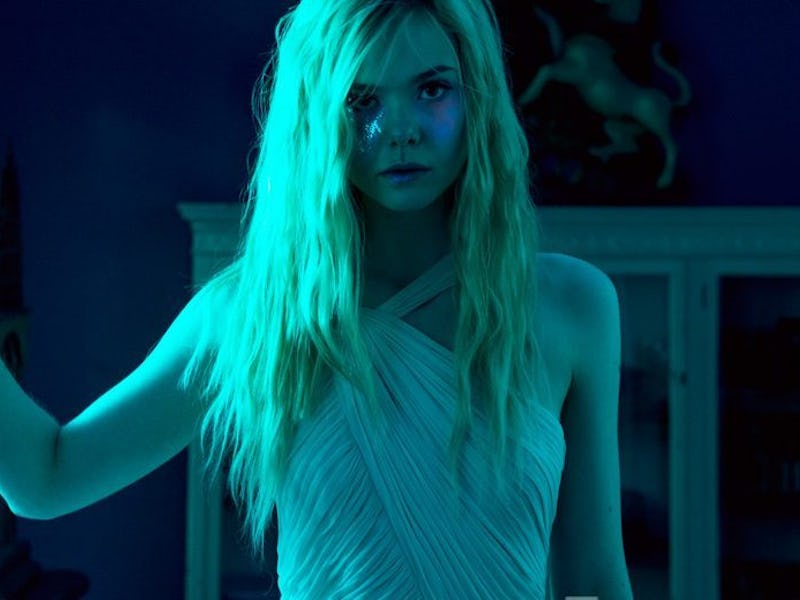Neon Demon' Illuminates the Difference Between Amazon and Netflix
It's a movie that's think-piece worthy, but just not worthy of a second viewing.

Late in controversial filmmaker Nicolas Winding Refn’s gloriously deviant new film, The Neon Demon, actress Jena Malone, who plays a Hollywood makeup and cadaver artist named Ruby, climbs onto a fresh corpse and pleasures herself while thinking of the film’s pristine lead character, played by Elle Fanning. This necrophilic moment, intercut with Fanning sprawled out in increasing ecstasy on a gorgeously opulent divan like some painterly tableau, is one of a collection of jarring scenes in Refn’s film. The Neon Demon is ostensibly about a small-town orphan (Fanning) who moves to Los Angeles to begin a modeling career and finds herself challenged by a pair of jealous fashion veterans (Bella Heathcote and Abbey Lee), but is actually a slick and semi-experimental horror film about beauty, superficiality, power, and cannibalism.
It is wholly unique, and is the kind of batshit crazy movie that only Refn could dream up — and only Amazon would finance.
Refn is a filmmaker of extremes. After a career in his native Denmark making violent films about drug dealers and criminals, he broke through in America with the Ryan Gosling-starring 2011 film Drive. The now-cult classic was a New Wave-esque ode to 1970s crime dramas, punctuated by moments of savage ultra-violence. Then he followed that up with the controversial 2013 film Only God Forgives, which ostensibly chronicled an American expatriate’s criminal dealings in Bangkok, if you could find the story.
Refn, perhaps more than any other living filmmaker, creates movies with a distinct blend of beauty and brutality that defines him as a singular auteur (his literal stamp can be found in The Neon Demon’s multi-hued opening credits that permanently feature his initials). So it’s no surprise that Amazon Studios wanted to work with him on his next film.
With the proliferation of streaming platforms with near-unlimited financial resources moving into creating their own content, it quickly became obvious that as Amazon’s own original feature film lineup grew it would release much different entertainment than its competitors. By comparison, Netflix primarily produces original content directly based on its audience’s own sprawling tastes. As a recent New York Times Magazine article about Netflix’s pioneering role in the streaming revolution noted, “Its ability to analyze vast amounts of data about its customers’ viewing preferences helped it decide what content to buy and how much to pay for it.”
It’s why general audience friendly funnyman Adam Sandler got a big four-movie deal at Netflix, and the company is running as many cartoon spinoffs as DreamWorks Animation can spit out. Whenever the company, once a champion of indie film accessibility, wants to satisfy that itch, they just buy small-time Sundance favorites like the recent The Fundamentals of Caring.
Amazon Studios chief Ted Hope, who spent much of the ‘90s producing critically acclaimed indie films, says his company’s approach is the exact opposite. “I know you all want to know about the secret Amazon algorithms for how we pick our films and spend money,” he said at the Seattle Film Festival over the weekend, specifying it’s more of an instinctual process. “I constantly say, ‘Why do movies suck? Why are these scripts just not better?’”
Needless to say, Amazon is much more likely to produce auteur-driven flicks like The Neon Demon than movies Adam Sandler fart jokes. The idea is to incentivize sales of its all-encompassing Prime subscription model, which delivers groceries as well as high-brow indie fare. It’s a move to sign up the upper-echelon of people who may not need a rush delivery on a pack of Diet Coke, but do want to see original films from Jim Jarmusch (Paterson), Kenneth Lonergan (Manchester by the Sea, and Todd Solondz (Weiner-Dog*).
Despite their best artistic intentions, this could create a business problem form Amazon (though it’s certainly not the bulk of their revenue): Will they end up creating stuff that, while interesting, doesn’t stick in the greater creative cultural conscience? Is it better to have big swings that go don’t make a huge dent, like Spike Lee’s Chi-Raq or Whit Stillman’s Love & Friendship? Or is it better to have general audience-focused data-determined mediocrity?
The Neon Demon is somewhere in the middle, and it’s obviously a wise transition for Amazon. Refn’s movie is an artistic home run, but it’s at times perhaps too much of a Refn movie for Refn’s own good. Despite Fanning’s terrifying angel performance, including moments when she’s being smeared with gold paint at a photo-shoot or cowering in fear from an overtly metaphorical mountain lion that broke into her seedy LA hotel room, it’s a movie that’s more interesting to talk about than to watch.
That doesn’t seem to matter to Hope, who calls all the shots. At the talk in Seattle, he said that “it’s just surprising to me how many people aim for mediocrity. They’re not willing to dream big, to believe that they could take the form further, take the emotions deeper, take the style into a different place.”
The best way to fix this problem is for Amazon to continue to do what it’s doing. In that same discussion, Hope more or less said the same thing. “We can engineer our processes to make better movies by simply improving our practice,” he suggested. They need to offer up the financial support without sacrificing the identity that brought the auteurs to the streaming service in the first place. You’ve probably never seen a next step like The Neon Demon.